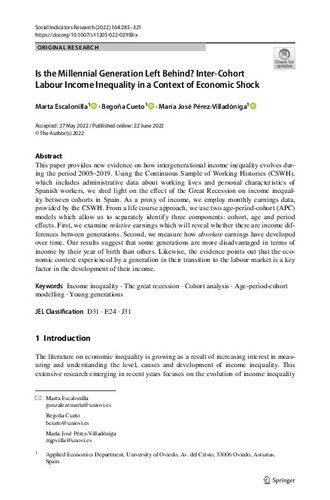Is the millennial generation left behind? Inter-cohort labour income inequality in a context of economic shock
Autor(es) y otros:
Fecha de publicación:
Versión del editor:
Citación:
Descripción física:
Resumen:
This paper provides new evidence on how intergenerational income inequality evolves during the period 2005–2019. Using the Continuous Sample of Working Histories (CSWH), which includes administrative data about working lives and personal characteristics of Spanish workers, we shed light on the effect of the Great Recession on income inequality between cohorts in Spain. As a proxy of income, we employ monthly earnings data, provided by the CSWH. From a life course approach, we use two age-period-cohort (APC) models which allow us to separately identify three components: cohort, age and period effects. First, we examine relative earnings which will reveal whether there are income differences between generations. Second, we measure how absolute earnings have developed over time. Our results suggest that some generations are more disadvantaged in terms of income by their year of birth than others. Likewise, the evidence points out that the economic context experienced by a generation in their transition to the labour market is a key factor in the development of their income.
This paper provides new evidence on how intergenerational income inequality evolves during the period 2005–2019. Using the Continuous Sample of Working Histories (CSWH), which includes administrative data about working lives and personal characteristics of Spanish workers, we shed light on the effect of the Great Recession on income inequality between cohorts in Spain. As a proxy of income, we employ monthly earnings data, provided by the CSWH. From a life course approach, we use two age-period-cohort (APC) models which allow us to separately identify three components: cohort, age and period effects. First, we examine relative earnings which will reveal whether there are income differences between generations. Second, we measure how absolute earnings have developed over time. Our results suggest that some generations are more disadvantaged in terms of income by their year of birth than others. Likewise, the evidence points out that the economic context experienced by a generation in their transition to the labour market is a key factor in the development of their income.
ISSN:
Notas Locales:
OA ATUO22
Patrocinado por:
Open Access funding provided thanks to the CRUE-CSIC agreement with Springer Nature. This study was funded by AGENCIA ESTATAL DE INVESTIGACION (M. ECON. IND) (Project number MCI-21-PID2020-115183RB-C21) and University of Oviedo (Project number PAPI-19-PF-02).
Colecciones
- Artículos [37548]
- Economía [312]
- Investigaciones y Documentos OpenAIRE [8420]
Ficheros en el ítem





